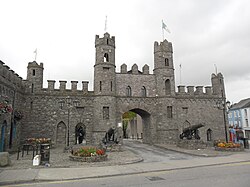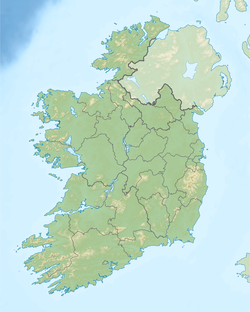Macroom
Maigh Chromtha (Irish) | |
|---|---|
Town | |
 Macroom Castle entrance and cannons | |
| Coordinates: 51°54′17″N 8°57′35″W / 51.9047°N 8.9597°W | |
| Country | Ireland |
| Province | Munster |
| County | County Cork |
| Population | 4,096 |
| Time zone | UTC±0 (WET) |
| • Summer (DST) | UTC+1 (IST) |
| Eircode routing key | P12 |
| Telephone area code | +353(0)26 |
| Irish Grid Reference | W337729 |
| Website | macroom |

Macroom (/məˈkruːm/; Irish: Maigh Chromtha) is a market town in County Cork, Ireland, located in the valley of the River Sullane, halfway between Cork city and Killarney. Its population has grown and receded over the centuries as it went through periods of war, famine and workhouses, forced emigration and intermittent prosperity. The 2011 census gave an urban population of 3,879 people,[2] while the 2016 census recorded 3,765 people.

Macroom began as a meeting place for the druids of Munster. It is first mentioned is in 6th-century records, and the immediate area hosted a major battle c. 987 involving the Irish king Brian Boru. During the Middle Ages, the town was invaded by a succession of warring clans, including the Murcheatach Uí Briain and Richard de Cogan families. In the early modern period the MacCarthys took control and later the area found prosperity via milling. The MacCarthys built a series of tower houses, some of which survive.[3] The family lost influence during the Williamite wars of the 1690s, after which authority over the town castle waxed and waned between the MacCarthys and a number of Anglo-Irish families.
The population fell in the 1840s during the Great Famine. Evidence can be found in the former workhouse, now the district hospital at the north side of New Street, and the mass graveyard to the west, near Clondrohid. During the late 18th and early 19th century, a number of Anglo-Irish families, and a branch of the Massey family, settled in the area. Many of their estate houses were burned in the period around the Irish War of Independence as the town was caught up in the turmoil of IRA activity.
Today the town is an economic hub for the mid-Cork region, and the location of a Danone milk processing factory, which dries and cans infant formula from milk supplied by local dairy farmers. Until the 1950s, New Street was the town's economic hub, and contained many small retail outlets.
- ^ "Census Mapping - Towns: Macroom - Population Snapshot". visual.cso.ie. Central Statistics Office. Retrieved 15 June 2024.
- ^ "Area Profile For Town Macroom Legal Town And Its Environs Co. Cork Archived 24 April 2021 at the Wayback Machine". CSO. Retrieved 24 April 2021
- ^ Keohane 2020, p. 490.

